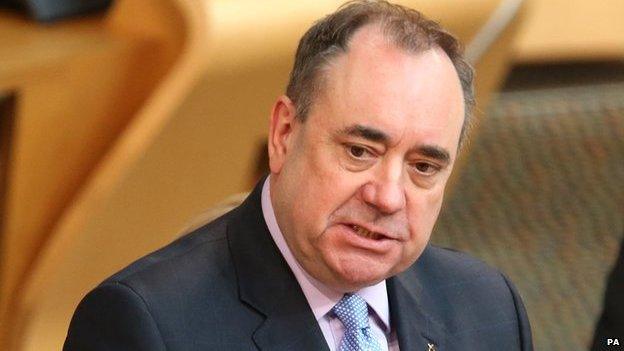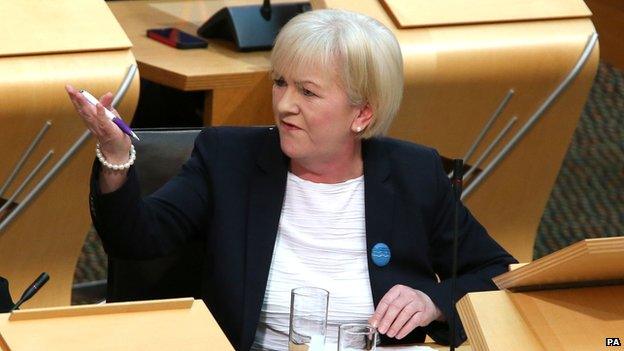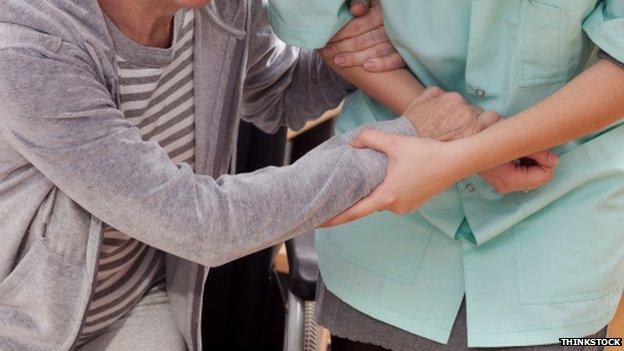Health of the NHS comes under fire
- Published

Alex Salmond's colleagues had a grim demeanour during first minister's questions
Sometimes parliamentary questions are tough. Sometimes they are pimps. Let me draw your attention to one of the latter.
Did the first minister agree, John Mason wondered, that Scotland's population would only properly grow, develop and flourish under the circumstances provided by independence?
You know what? He did. Which was one of the very few substantive mentions of independence during first minister's questions.
Why? Because exchanges were dominated by a behaviour trend among that population. Their propensity to head to accident and emergency units when sick or injured (or anxious) and the challenge thus caused for said A&E teams.
It was not an easy one for the first minister, placing it into category one outlined above. But he handled the topic robustly and with vigour - eschewing satire, irony and invective in favour of solemnity, gravity and detail.
There was, however, time for the FM to argue that matters had been worse under Labour - and that provision in England and Wales continued to lag behind Scotland.
'Tweaked'

Ms Lamont was pleased to ask a question not related to the independence referendum
The topic had been raised by Labour's Johann Lamont who noted that a target for waiting times in A&E had been missed, then tweaked to make it easier then missed again. By building upon that basic message, she delivered an effective challenge.
But Mr Salmond gave it back. The figures, he said, had been notably worse under the government of which Ms Lamont was a member. That, she retorted, was a "staggering" degree of complacency. No, said Mr Salmond, it was simple fact.
On Ms Lamont's part, there was apparent, indeed palpable, political satisfaction at dealing with a mundane, contemporary matter - rather than what she occasionally characterises as the more esoteric elements of the constitutional debate.
She has repeatedly noted that she did not enter politics to debate the constitution - but rather to deal with issues of poverty and gender. Equally, however, I feel sure she reflects that the reason she is embroiled in such a debate is that her party lost at the last Holyrood election, big style.
In any event, Ms Lamont's evident distaste for the referendum debate did not prevent her from concluding that Mr Salmond cared more about the constitution than he did about the health of people.

MSPs rowed over proposed changes to funding for patients in nursing homes who need medical treatment
The first minister retorted that his government had taken action - through an emergency fund and other measures - to improve the figures. Figures which, he repeated, remained better than in the relatively recent past.
He gave comparable replies to Ruth Davidson of the Conservatives and Willie Rennie of the Lib Dems. Mr Rennie pursued another point: proposed changes in the financing of care for patients in nursing homes who require continuing medical treatment. That later generated a substantial row in the chamber.
At present, those who receive continuing healthcare are either in hospital or at home - or in residential care where their accommodation is funded by the NHS as if they were in hospital. An expert group has proposed changing that, implying that accommodation charges would be levied in future in such circumstances.
Mr Rennie said this was a "perverse" incentive to keep patients in hospital: the very bed blocking which Johann Lamont had identified as a partial cause of the problems in A&E.
'Bunkum'
Later, the health secretary, Alex Neil, faced questions from MSPs after he delivered a statement on care services. Labour's Neil Findlay pursued his customary tactic of vituperative opposition: the plan, he said, was a "fundamental breach" of the NHS and possibly illegal.
Mr Neil responded in kind. The claim was "absolute bunkum of the first order". There would be no charging for healthcare. Nothing would change at all until national guidelines are in place from April next year. He told Jackson Carlaw of the Tories that he would seek consensus meantime.
On which note, perhaps I might close by reporting that the first minister has sanctioned a pilot in Scotland for a version of "Clare's Law" - which allows an individual to find out from the police whether their partner has a history of violence or abuse.
This has been pursued by Ms Davidson - and so Mr Salmond chose to make the announcement during her turn at questions today.